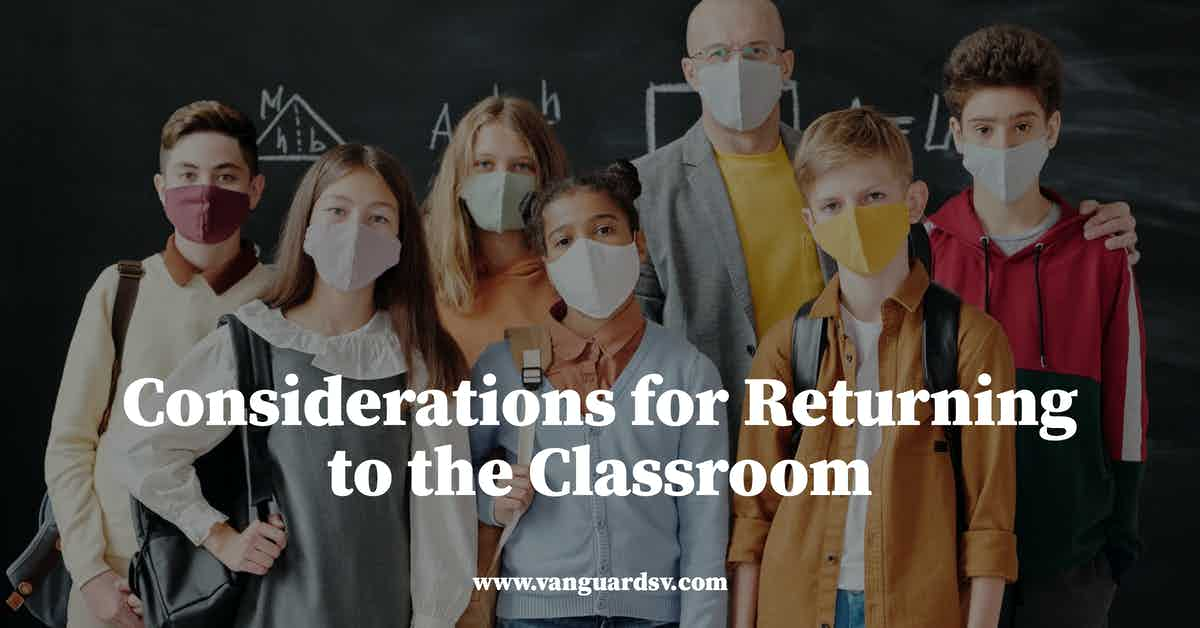More than 18 months after initial reports of COVID positive patients began circulating, schools are still struggling with how to best deal with in-classroom learning--a concept significantly exacerbated by the emergence of a COVID-19 Delta Variant and a looming 'bounce back' influenza season.

Key Strategies for Safely Returning to the Classroom for the 2020-2021 School Session
The start of the 2020-2021 school season is rapidly approaching, and many students, parents, and teachers are anxious about the health and safety of the occupants and the hygiene of the various facilities.
The California Department of Public Health recently released updated guidance regarding:
- In-Classroom Learning - considered critical, and is the primary focus of this school year.
- Social Distancing - reduced to three feet from last year's six feet.
- Masks - required for all occupants who are not fully vaccinated while indoors where social distancing is difficult to accomplish, but voluntary outdoors.
- Stay Home When Sick - follows last year's guidelines of staying home when you feel sick and getting tested before returning to the classroom.
- Increased Ventilation - indoor ventilation systems should be set to maximize indoor airflow and allow for MERV 13 or higher rated HVAC filters combined with in-classroom air filtration systems.
- Hand Hygiene - should be promoted and reinforced by in-classroom instructors, as well as guidance regarding hand placement in public spaces, and;
- Enhanced Cleaning - should adhere to the policies of clean, then disinfect at least once per day, more often if cases begin to rise or if localized outbreaks occur in the community.
Source:
Concerns Regarding COVID Delta Variant
Concerns regarding the Delta variant of the SARS-CoV-2 virus spreading in the classrooms are not without merit.
Presently, children between the ages of 5 and 12, making up a significant portion of the students in the US education system, are not eligible for vaccination.
According to a recent paper published by Yale Medicine, that places them and those around them at greater risk.
Delta is the name for the B.1.617.2. variant, a SARS-CoV-2 mutation that originally surfaced in India.
Toward the end of June, Delta had already made up more than 20% of cases in the U.S., according to Centers for Disease Control and Prevention (CDC) estimates.
That number is rising swiftly, prompting predictions that the strain will soon become the dominant variant here.
A recent study from the United Kingdom showed that children and adults under 50 were 2.5 times more likely to become infected with Delta.
And so far, no vaccine has been approved for children 5 to 12 in the U.S., although the U.S. and a number of other countries have either authorized vaccines for adolescents and young children or are considering them.
Concerns Regarding a 'Bounce Back' Influenza Season
The 2019-2020 influenza season was almost non-existent.
According to health officials, that raises concerns regarding and absence of immunity due to lack of exposure.
Several possibilities exist:
- Individuals, businesses, and communities maintain the high levels of hygiene standards implemented during the height of the pandemic, and we have a relatively mild influenza season.
- A surge in COVID cases due to the Delta variant or the emergence of other strains forces everyone back to pandemic-level hygiene and sanitation standards, limiting the impact and spread of influenza, or;
- Relaxation of standards results in a rise in both COVID and Influenza cases.
According to Professor Chris Whitty, England’s Chief Medical Officer;
Either we will have a very significant Covid surge, people will minimize their contacts and we will have less respiratory viruses, or people will be back to a more normal life, there will be some Covid but on top of that we will go back to having a flu surge, an RSV (respiratory syncytial virus, a common respiratory virus that usually causes mild, cold-like symptoms) surge in children, and so on.
I think we need to be aware of and brace for the fact that the coming winter may well be quite a difficult one.
Health experts are anxious to prevent a ‘catastrophic’ winter flu season
CDC Facility Cleaning and Disinfection Guidelines
The US Centers for Disease Control and Preventions guidelines for cleaning and disinfecting a facility remain the same as last year:
- Normal daily cleaning with a commercial-grade detergent followed by targeted hotspot disinfection with a product listed on the EPA's list N is sufficient for facilities in communities with little to no spread of influenza or COVID.
- Increased rates of cleaning and safe disinfection practices are only recommended during localized outbreaks or in communities with low vaccination rates.
- Safe, targeted disinfection of high touch surfaces throughout the day followed by routine cleaning practices at the end of the day are proven to halt and prevent the spread of influenza.
References & Resources
- Guidance for COVID-19 Prevention in K-12 Schools
- Aerosol Transmission and Airborne Diseases
- Cleaning and Disinfecting Your Facility
Takeaway
The potential for a rise in COVID and influenza cases, with classrooms as a flashpoint, is relatively high.
Disrupting the chain of infection can be accomplished by combining proven enhanced cleaning and disinfection services with commonsense personal hygiene and flu season social distancing practices.
Outsourcing is a proven method for onboarding increasingly in-demand sustainable cleaning for health services, tools, and expertise for a fraction of the cost of maintaining a similar service in-house.
If you would like more information regarding the effectiveness of high-performance infection prevention and control measures, or if you would like to schedule a free, no-obligation onsite assessment of your facility's custodial needs, contact us today for a free quote!
In Bakersfield, CA, call (661) 437-3253
In Fresno, CA, call (559) 206-1059
In Valencia CA, or Santa Clarita CA, call (661) 437-3253
In Palmdale, CA or Lancaster, CA, call (661) 371-4756

